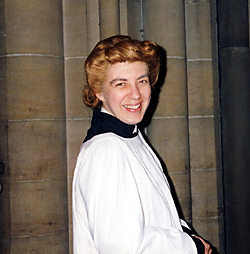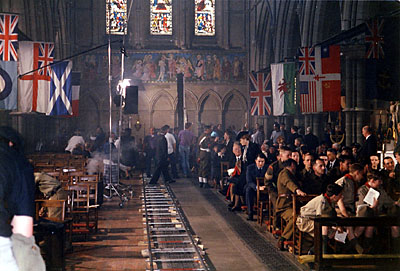JMS, in his commentary on one of my favourite B5 episodes, “Severed Dreams”, pointed to the scene in which the crew make the choice to stand and fight as pivotal. Later, he lingers over the scene of Sheridan and his father as one of his favorites: two people talking, saying less than they feel, but affirming a connection when one of them may not return. He does fine action – his commentary on the battle scene is full of relish at the accomplishment of pulling off such a sustained, complex special effects sequence – but what is important is the drama. And that’s why I love his work.
‘Twern’t always so. B5 left me cold when I saw the pilot on my old B&W TV in Leeds. There was this guy with big hair and a Transylvanian accent, the alien with a lech for human women, another alien composed of substances we wot not of drifting around emitting gnomic utterances, and the usual clutter of uniforms. For the first season I ignored it. Then, for reasons unknown to me now, I tuned in again for the second season episode “Revelations”. Over the subsequent three and a half years the guy with the Transylvanian accent turned into one of SF’s great tragic villains. The lecher proved to have deep religious faith and a capacity for change as impressive as his bombastic arrogance. The ‘good wizards’ – figures seldom questioned in SF – proved out to have unsuspected ties to the great enemy. The uniforms backed, step by step, into mutiny, insurrection and war. Much of it done with a control of narrative technique that is an education. The replay of B5 on Space Channel at an inaccessible hour during my residency has prompted me to master a technology which has intimidated me for years: the VCR.
To enumerate some of the show’s other delights:
- Stephen Furst’s Vir, a timid man with a sure moral compass.
- Mira Furlan’s Delenn, a lady, a scholar, and kicker of Earth Force’s collective butt.
- Bill Mumy’s Lenier, a good and devoted young man who, alas, has not faced his own darkness
- Walter Koenig’s twitchy, oily evil portrayal of psi cop Bester.
- The estimable Dr. McCoy would never, as Dr. Stephen Franklin does, fail to find a cure for a plague, defy a parental veto on treating a fatally ill child and see the parents kill the child to save its soul, develop a drug addiction and nearly lose his own life while trying to find himself.
- Michael ‘even paranoids have enemies’ Garibaldi, as his unrecognized brainwashing gradually turned him against his former allies, culminating in his betrayal of his commander and friend.
- The central place of faith to many of its characters. TV SF tends to treat religion in terms of politics or ritual, and render it either prosaic or grotesque, when not shying away completely. I think particularly of the STTNG episode “First Contact”, marred for me by the cowardice on making the opponent of contact a “political officer” defending an “ideology” which insists the Malcorans are alone in the universe. Religion in B5 can be absurd, transcendent, colourful, mystical, moral, irrational, much as it is in the real world.
- The shocking filmic elegance of those moments of violence which are both plot-pivotal and emotionally crucial: Garibaldi’s shooting by his second in command, the Narn security recruits throwing themselves against the entrenched Night Watch, the mob murder of Lord Refa, the betrayal and capture of John Sheridan.
- The noshing! Someone on rec.arts.sf.babylon5 once compiled of a list of who ate what with whom in the first two seasons. Infinite diversity in infinite combinations indeed.
- The voracious little blonde briefly assigned to John Sheridan as a security officer, who was seen tucking in with a will on at least two occasions. What a touch of characterization. Tell me the last time you saw an slim, wicked woman on TV doing anything other than picking at a salad?
- The gloriously spiky Shadow ships. For that matter, all the various, distinctive shapes.
- The handling of sex, subtle where it needed to be, charged where it needed to be. One area where it’s readily proven that ‘the secret of being boring is to tell everything.’
 While rummaging through boxes of old negatives in search of a certain damaged negative I am wondering if I might resurrect, I happened upon a handful of photos from my brief, obscured* career as a television extra. The series was Seaforth, filmed in Leeds, and a member of the choir I was in was organist at the church chosen to film a memorial service for the war dead after which the military police showed up to arrest the hero. They needed a choir. So I took a day off work, and went back to the 1940s. All the mens’ hair was too long, so they got haircuts, and all the womens’ was too short, so we got wigs, though the hairdresser was vexed that the wigs had too posh a hairstyle for our class. She teased and tugged and restyled. It was mid afternoon before the hairstyling and the dressing and the makeup and the standing around progressed to filming, which consisted of standing in the choir stall watching the hero squeeze into a row, take a hymnbook and start conspicuously singing. Over and over again. *Alas, when the series aired, in the single long shot down the aisle, I was hidden behind the bishop. My gutteral pronunciation of Earth, though, is audible on the sound-track rendition of “Abide with Me.”
While rummaging through boxes of old negatives in search of a certain damaged negative I am wondering if I might resurrect, I happened upon a handful of photos from my brief, obscured* career as a television extra. The series was Seaforth, filmed in Leeds, and a member of the choir I was in was organist at the church chosen to film a memorial service for the war dead after which the military police showed up to arrest the hero. They needed a choir. So I took a day off work, and went back to the 1940s. All the mens’ hair was too long, so they got haircuts, and all the womens’ was too short, so we got wigs, though the hairdresser was vexed that the wigs had too posh a hairstyle for our class. She teased and tugged and restyled. It was mid afternoon before the hairstyling and the dressing and the makeup and the standing around progressed to filming, which consisted of standing in the choir stall watching the hero squeeze into a row, take a hymnbook and start conspicuously singing. Over and over again. *Alas, when the series aired, in the single long shot down the aisle, I was hidden behind the bishop. My gutteral pronunciation of Earth, though, is audible on the sound-track rendition of “Abide with Me.” The view from the choir stalls.
The view from the choir stalls.